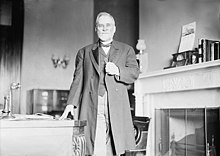William R. Webb
| William Robert Webb | |
|---|---|
 |
|
|
United States Senator from Tennessee |
|
|
In office January 24, 1913 – March 4, 1913 |
|
| Preceded by | Newell Sanders |
| Succeeded by | John K. Shields |
| Personal details | |
| Born |
November 11, 1842 Person County, North Carolina |
| Died | December 19, 1926 (aged 84) Bell Buckle, Tennessee |
| Nationality | American |
| Political party | Democratic |
| Spouse(s) | Emma Clary |
| Children | William Robert, Jr. (1874-1960) Alla (1875-1944) John Stanford (1877-1951) Adeline (1879-1968) Susan (1882-1980) Emma (1884-1973) Thompson (1887-1975) |
| Alma mater | University of North Carolina at Chapel Hill |
| Occupation | Soldier, Educator |
William Robert Webb (November 11, 1842 – December 19, 1926) also known as Sawney Webb, was an educator who founded the Webb School and served briefly as a Democratic United States Senator from Tennessee.
Webb was born in Person County, North Carolina. He was the grandson of Richard Stanford, an early ten-term United States Representative from North Carolina. His father, Alexander Webb, died when he was six years old. He attended private schools, including the Bingham School in Oaks, North Carolina, and then matriculated at the University of North Carolina at Chapel Hill in 1860. However, he soon left to join the Confederate Army in the Fifteenth North Carolina Infantry Regiment, in which he served until badly wounded at the Battle of Malvern Hill on July 1, 1862. While recovering from his wounds, he again attended UNC. In the spring of 1864, he re-enlisted as a private in the Second North Carolina Cavalry Regiment and had risen to the rank of Captain by the time of his capture on April 3, 1865 after the Battle of Namozine Church. He was imprisoned on Hart's Island in western Long Island Sound and then transferred to Castle Williams on Governors Island in June, 1865, from which he escaped for a one-day adventure in the city. After the conclusion of the Civil War he returned to UNC, graduating in 1868 and subsequently teaching at a private school in Oxford, North Carolina until 1870.
...
Wikipedia
